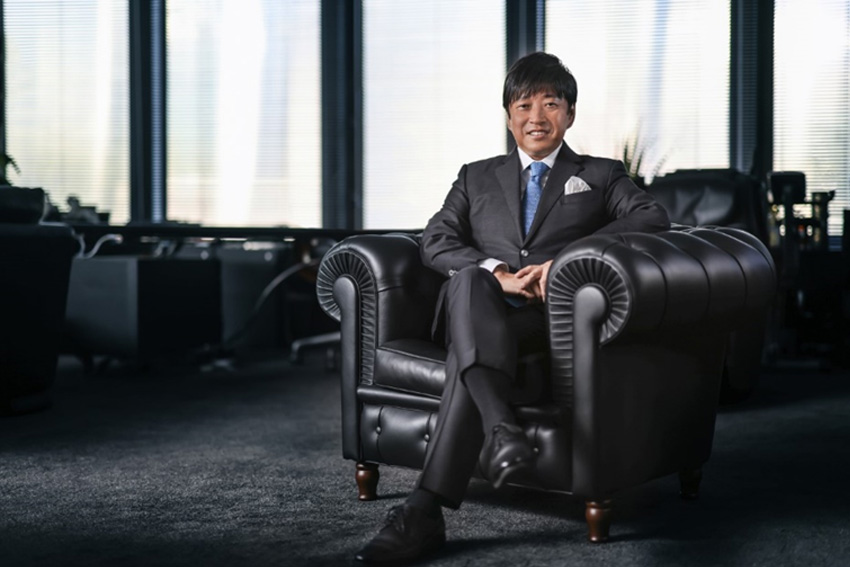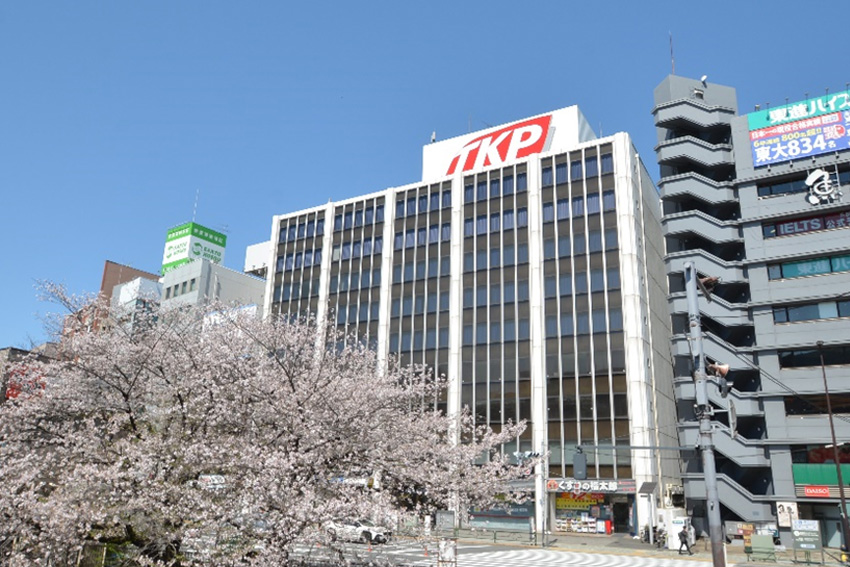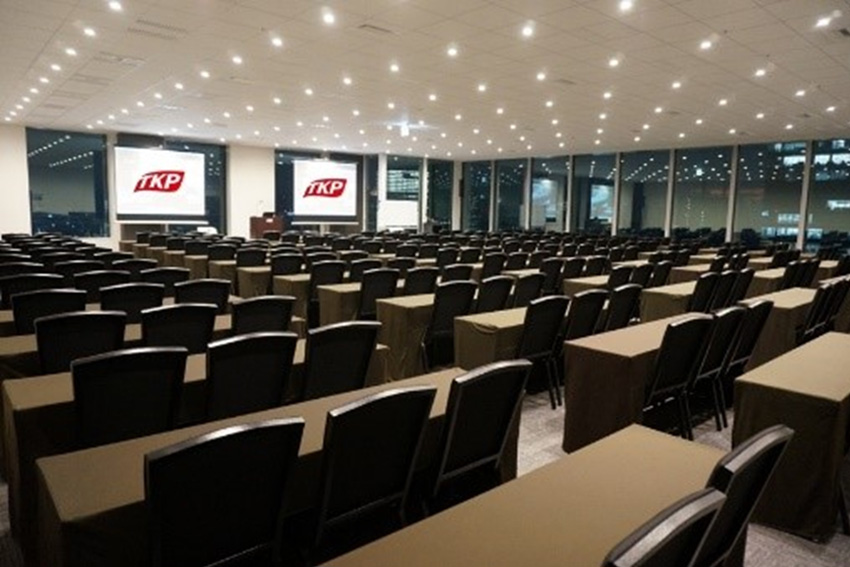The transcript delves into various aspects of TKP's business, highlighting Japan's current economic landscape, TKP's business model, and its international expansion. TKP identifies potential in the office space market, leveraging its flexible space business model and targeting areas like Tokyo Station for expansion.

In our view, Japan is now in a very vibrant period for manufacturing. On the one hand, there have been major supply chain disruptions over the past three years due to the COVID-19 pandemic and tensions caused by the decoupling (economic separation) situation between China and the US. As a result, we are seeing many multinational companies trying to diversify their supply chains with an emphasis on reliability. This is where Japan can step in. A country known for decades for its high reliability, credibility, and short delivery times concerning production. We believe that now is the perfect time for Japanese manufacturers to respond to the pressing needs of this macroeconomic environment, given the weakening of the yen. Do you agree with this premise and why, and what advantages do you see for Japanese companies in the current economic environment?
Although the Japanese stock market and real estate market appear to be on the rise these days, in reality, only the Nikkei 225 companies are rising. Others, including ours, are falling.
Speaking of the Nikkei 225, a new system called NISA was introduced in early 2024, and stock prices soared in this new system. The real estate market is being bought by foreigners and sold by the Japanese. Securities companies are inevitably buying in index funds.
As for the office situation, there are many vacancies in Europe and New York, disrupting the market. In contrast, however, the Japanese are industrious and prefer to go to work to gain real-world experience. In Japan, attendance rates are returning to pre-Corona disaster levels. The challenge facing the Japanese market is that as buildings are completed over the next few years and companies move into these new buildings, vacancies in aging office buildings, especially around Tokyo, will increase.
Just as the Nikkei 225 is driving the stock market, the real estate market continues to soar as office vacancies are minimal while vacancies are increasing in other real estate. In this sense, Tokyo's attractiveness as an international city is increasing. I am confident in this view because a similar situation is occurring in other Western countries, New York City, where people flock to landmark towers, and New Jersey, where office prices have fallen due to high vacancy rates, are good examples. One major difference is that New York City, for example, has only two major train stations, Grand Central Station and Penn Central Station, while Japan has many major stations such as Tokyo, Shinagawa, Ueno, and Roppongi. Many offices are built around these major stations.
We see the construction of new office buildings in the Tokyo Station area as a great business opportunity for us. We believe that these new buildings can be used as TKP's leased office space in the short term.
TKP's main business is the flexible space business. The company currently has 1,800 employees. We are particularly proud of the Corona Disaster, where we were able to reverse a bad situation and provide space for vaccinations. The way we describe our business is to create new social value from the distribution of renovated space, and much of our business is centered around Tokyo Station. We can say that our core competence (a core capability that our competitors cannot imitate) is to purchase idle real estate from real estate owners at a discount, renovate that space into value-added space, and then share that space. The real estate is not owned but secured in the form of a lease agreement. In addition to our business model, we can leverage our affiliates to perform renovations.
While our main business is in the Tokyo Station area, we are applying the same business model to the Shinagawa Station area and other areas as well. There are seven locations here, so when you walk around the area you will see the TKP logo in many places.

TKP Ichigaya Conference Center
TKP became famous as the company that pioneered the idea of flexible workspaces around 2019. Then COVID-19 occurred and we began to see real hype surrounding the use of flexible office space. As a result, many experts are questioning the long-term potential of office buildings, and many questions are being raised about how office space will be utilized over the next 5, 10, and 20 years. How do you envision the future utilization of office space and how is this reflected in TKP's properties and services?
The office market was huge, but the rental market was very small. For a while, the dominant player in that market was long-term rentals. Short-term office use was not very common in the beginning, but through partnerships with companies like Regus, we have increased our flexible office offerings. At the time of our founding, we had high hopes for providing flexible office space specifically for training seminars and other purposes. We also wanted to work with Regus to offer these services to both domestic and international clients.
At the time, 6% of our London offices were flexible offices, and we wanted to bring that number up to 30%. The Asian market would be up to TKP. (TKP would be in a position of responsibility in the Asian market.) In the market, companies seem to continue to rent offices at high rents but often rent smaller spaces because the prices are too high. Not all uses can be covered; project offices and space for training come to mind. This is where TKP's business model can be very helpful to our clients.
In recent years, there has also been a significant increase in the number of self-employed and freelance workers. This means that there is a high demand for coworking spaces. Traditionally, Japan had a culture of lifetime employment, but this is now changing to contract-based freelance work, and TKP hopes to provide spaces that fit this way of working.
Globally, there is a trend toward more individual-driven work. For example, the event planner works independently as a freelancer. Ideally, we see TKP providing space for freelance individuals as a model for Japan's future.
Traditionally, Japanese people felt that they wanted to work for a particular company and felt they needed to conform to that company's workplace culture and lifestyle. People's lifestyles have changed over time, and many no longer feel bound to work for only one company. The focus of work and working styles is now placed on the job and the individual, not the company. By shifting individuals into the freelance space, they can better manage their time and support the Japanese government at the same time. This is an area where TKP can make a difference, not only by encouraging people to take positive steps toward a freelance lifestyle but also by providing a space for these individuals to work.
TKP's offices can be used in a variety of ways. Satellite offices are just one example of the countless possibilities. While co-working spaces often offer individual rooms, which can be expensive, TKP offers semi-rooms, which can be more cost-effective.
The digital nomad model became very popular during the COVID-19 pandemic and allowed companies like yours to offer flexible office space when traditional offices closed. Before the coronavirus disaster, digital nomads were on the rise, now numbering 35 million worldwide, with experts predicting 1 billion by 2035. In terms of your business model, how do you plan to respond to Western digital nomads who see Japan as an attractive place to work?
Expectations are high, and our affiliated company has a company that handles the renovation of old houses, so together with TKP's space rental service, we can offer a comprehensive service to digital nomads in Europe and the US at a lower cost than other companies.

TKP Garden City PREMIUM Kyobashi
WeWork is truly the elephant in the room when we talk about comparing business models. In comparison, TKP offers intangible aspects that differentiate it from WeWork, and we understand that these aspects and services are something we intend to expand in the future. How does your business model differ from WeWork's?
I visited WeWork's office in Tel Aviv and they were not aggressive business aggressors, I think their goal was to sell the company at a higher value within a couple of years. 2011 was TKP's first expansion into the U.S. Interestingly, the building above ours was Regus and the building next to it was WeWork. This meant that I had the opportunity to constantly monitor both of these companies.
WeWork's thinking is that there is a standard design that they want to apply and for that, they need to tear down the space, build it from scratch, and bring it out. We initially considered collaborating with WeWork, but they insisted on building from scratch, so instead we discussed it with Regus. Regus strongly argued that they could leverage space that already existed.
I think the fact that we do more work in existing buildings is a big differentiator between TKP and WeWork. They work primarily on new construction buildings, so they have a 10-year contract constraint, whereas the older buildings we deal with don't have that constraint. Another important point is that our business model has a much lower capital expenditure (CapEx).
TKP is a pioneer in resort seminar hotels. In Japan, there is a strong government and private sector push to make Japan a destination for MICE (Meetings, Incentives, Conferences, and Exhibitions) tourism. This sector is expected to grow to US$7 billion annually by 2027Why do you think Japan is an interesting MICE destination? What services do you offer to make the MICE experience as smooth as possible?
There are two approaches to MICE: the first is to provide banquet and hotel space services near the convention center. Recently, we began operating banquet facilities at the former Prince Hotel, which is directly connected to the Makuhari Convention Center. Since MICE is often initiated by the Japanese government, we have a close network throughout the country, both in urban areas and in rural areas. There are many TKP workspaces in urban areas, and by working with APA Hotels, we can provide smooth and comprehensive services to MICE visitors. On the more regional side, there is the LecT ore brand of resort hotels that can be utilized as MICE destinations.
A second approach is more individualized corporate-based training and MICE experiences, such as those held at a resort hotel. There, we can provide a service that offers a spa experience in a smaller space. We are actively implementing inbound MICE and have a dedicated MICE department and a number of overseas event planners. TKP has a Type 1 travel agency license. It works with travel agencies in Taiwan and elsewhere and already offers this level of coordination services.
And MICE visitors can be approached on two different scales. Large-scale events are held in state-run conference halls, in which case we provide lodging and banquet services. For smaller events, TKP also acts as a coordinator, providing TKP's meeting rooms for MICE events and connecting large hall owners with events.
Our MICE services are centered on corporate bases, rather than large-scale, government-driven events. In other words, we provide a one-stop service, welcoming visitors from regional airports such as Narita and Haneda Airports.
Recently, you have also done M&A. What is your outlook for new M&A?
TKP is based around a business called flexible space leasing, such as meeting rooms, banquet halls, and event halls. We want to be able to meet the needs of the owners of such spaces and the customers who use the spaces, so we want to focus on the peripheral businesses related to them, especially the upstream businesses, and bring them to the group companies M&A is a very big part of that approach.
We have many B2B clients and they all have their own needs, and TKP hopes to support their businesses by offering additional new services such as catering and staffing.
Approximately 3 0,000 companies use our services annually. There are 4,000 listed companies in Japan, 2,000 of which use TKP's services. When people gather, whether it is for residential, business, banquet, or conference purposes, there is always a need for accommodations, and TKP also supports the management of events held by major companies such as Google, NVIDIA, and Rakuten. The companies we have mentioned are those we can disclose today, but there are many more we are not able to discuss. Ideally, we would like to further these activities in the future.
In 2017 we acquired MAJORS, an events company, and this new group division leads our coordination services. Interestingly, we started as a hardware (space) company and have now come to the point where we offer software (peripheral services). We want to stretch our network of peripheral services like a spider's web and expand the scope of what we can grab and. Since we sold Regus last year, we have a huge pool of assets to purchase. To answer your question, we certainly want to focus on mergers and acquisitions, especially upstream companies.
In 2013, we launched our international operations by bringing TKP to New York City with a 32,000-square-foot storefront in midtown Manhattan. After more than a decade in international operations, what are some of the biggest lessons you've learned?
Since 2011, we have expanded overseas to New York, Hong Kong, Singapore, Malaysia, and Taiwan. However, due to COVID-19, we had to close all of our overseas offices. Currently, we are isolated only in the Japanese market. A similar business operator came up in New York and took over our business. There is a risk that other companies in our industry will come to Japan and become our competitors, so it is important for us to continuously strengthen our business.
If we were to go abroad again, Asia would be our target. Combining meeting rooms with banquet, catering, and lodging services is essential to that expansion.
Imagine coming back in 10 years and redoing this interview. What goals or dreams would you like to accomplish before coming back for a new interview?
Our past peak sales were 543 billion yen and my personal goal is to become a trillion yen market cap company. due to COVID-19, our valuation dropped to only 30 billion yen, but thankfully it has now recovered to about 7, billion yen. Our goal is to triple the valuation first, and then to increase it to 1 trillion yen within 10 years.
For more details, explore their website at https://www.tkp.jp/english/
0 COMMENTS